|
|
|
Sort Order |
|
|
|
Items / Page
|
|
|
|
|
|
|
| Srl | Item |
| 1 |
ID:
153475
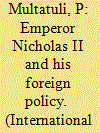

|
|
|
|
|
| Summary/Abstract |
DESPITE 100 YEARS that separate us from the time of Nicholas II, his role as the autocratic ruler of Russia's foreign policy remains practically ignored, let alone studied in any detail, by Russian and foreign historiography. In Russia, meanwhile, foreign policy was invariably the prerogative of the man on the throne, Nicholas II being no exception. According to Anatoly Ignatyev, "by law, tradition and convictions he was the sovereign ruler of Russia's foreign policy while he remained on the throne.
|
|
|
|
|
|
|
|
|
|
|
|
|
|
|
|
| 2 |
ID:
189212
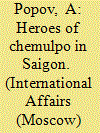

|
|
|
|
|
| Summary/Abstract |
ONE OF THE most legendary events in the history of the Russian Navy, the memories of which are still preserved by grateful descendants, took place in the first days of the Russo-Japanese War of 1904-1905.
|
|
|
|
|
|
|
|
|
|
|
|
|
|
|
|
| 3 |
ID:
148150
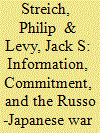

|
|
|
|
|
| Summary/Abstract |
We apply a modified version of the bargaining model of war to the outbreak of the Russo-Japanese War of 1904–1905. We conceptualize the informational path to war as a two-step process, the first identifying the sources of informational asymmetries, and the second specifying the causal linkages between informational asymmetries and war. The sources of informational asymmetries include not only private information and incentives to misrepresent that information, but also individual, societal, and governmental-level factors. We argue that the primary causes of the Russo-Japanese War involved a combination of the commitment problem and preventive logic arising from Russia's growing power relative to that of Japan, and informational problems arising from disagreements about relative power and resolve. These disagreements arose almost exclusively from Russian political and military leaders' underestimation of Japanese capabilities and resolve, and they generated highly intransigent Russian bargaining behavior. Russia misperceptions can be traced primarily to racial and cultural stereotypes and psychological biases, and to competition between rival domestic and bureaucratic factions that distorted information flows, created an incoherent decision-making process, and sent confusing signals to Japan.
|
|
|
|
|
|
|
|
|
|
|
|
|
|
|
|
| 4 |
ID:
133078
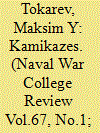

|
|
|
|
|
| Publication |
2014.
|
| Summary/Abstract |
Throughout history, despite the influence of Alfred Thayer Mahan's concepts, continental European and Asian navies have had a simple choice to make: either to create a balanced fleet to engage another balanced fleet at sea and defeat it in one or more "decisive battles" or to take an "asymmetrical approach," creating an "unbalanced" navy, able to prevent the enemy from achieving sea control and to keep one's own vital sea lines of communication (SLO Cs), if one has any, untouched by the enemy's naval forces.
|
|
|
|
|
|
|
|
|
|
|
|
|
|
|
|
| 5 |
ID:
152708
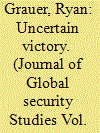

|
|
|
|
|
| Summary/Abstract |
War, as Clausewitz reminds us, is fought in the domain of uncertainty. Human nature, friction, and chance combine to create a fog that shrouds both friendly and enemy activities. Accordingly, effective warfighting is as much a product of information gathering and processing as deliverance of kinetic energy. Existing theories of military power, however, privilege the latter over the former. This paper seeks to address this imbalance and push forward scholarly understandings of martial capability by advancing a new framework for thinking about the way in which militaries’ capacities to manage uncertainty condition their abilities to generate combat power. The manner in which militaries organize their command and control structures is identified as a key factor in the management of uncertainty, and its role in facilitating both information management and the generation of martial strength is theorized. The command structure theory advanced is provisionally assessed through an examination of a key battle in the Russo-Japanese War—an engagement that Japan won but, by all conventional measures of military power, it should have lost. The paper concludes with a discussion of open questions raised by the claim as well as scholarly and policy implications.
|
|
|
|
|
|
|
|
|
|
|
|
|
|
|
|
|
|
|
|
|